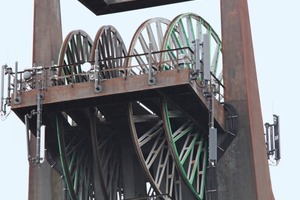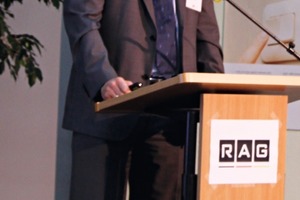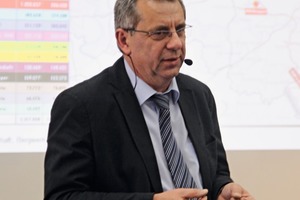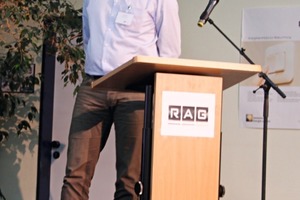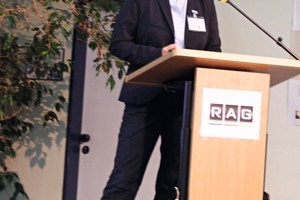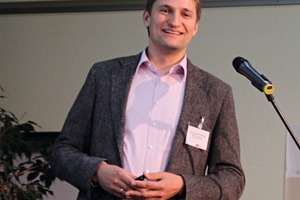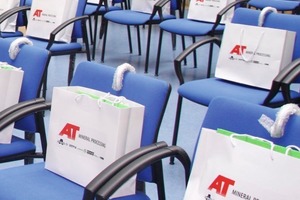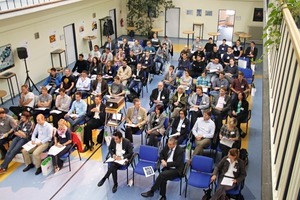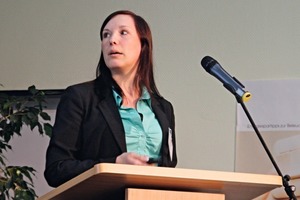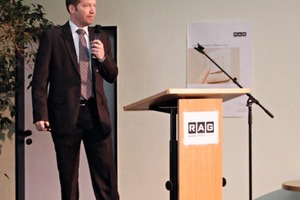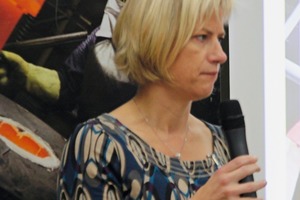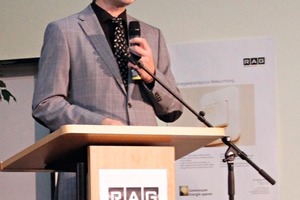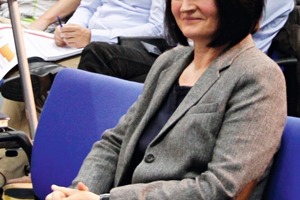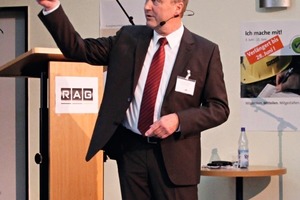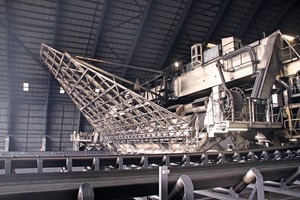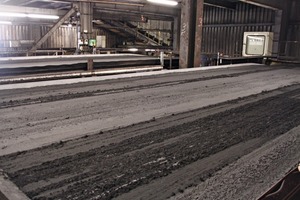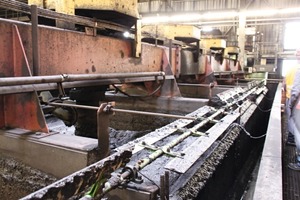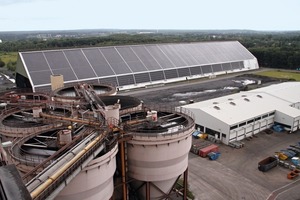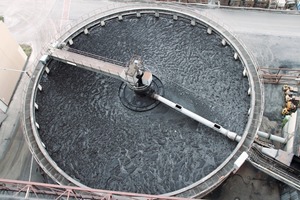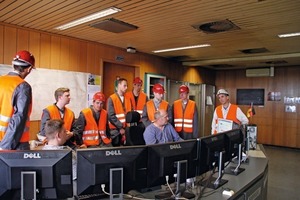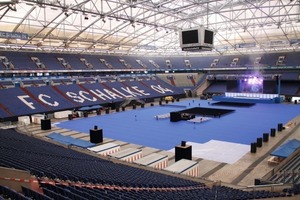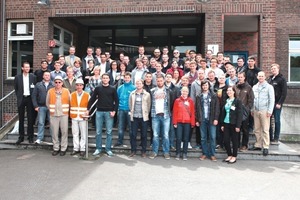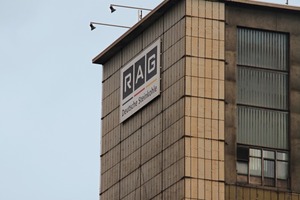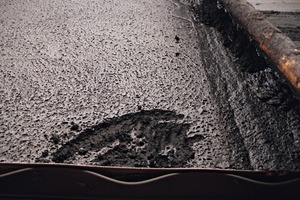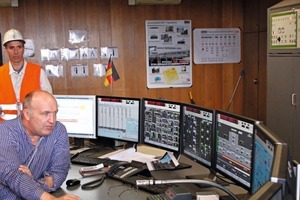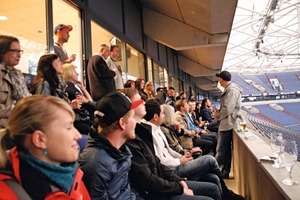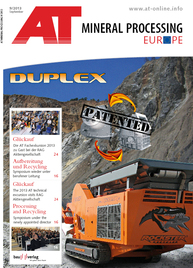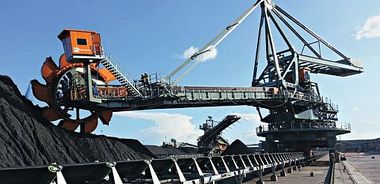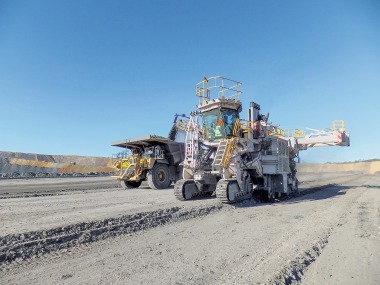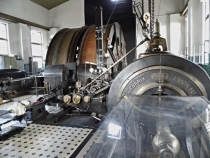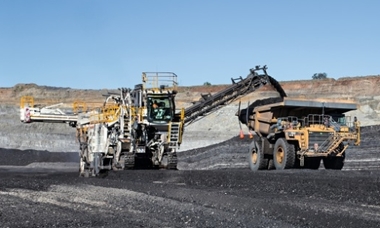Glückauf!
The 2013 AT technical excursion visits
RAG Aktiengesellschaft
An obligatory “Glückauf!” miner’s greeting (meaning, approximately, “Good luck while you’re underground, have a good and safe shift!”), simultaneously the motto of the event, was the welcome extended to the participants of this year’s AT student excursion to the Ruhr industrial region by Thomas Telsemeyer, director of production at the Auguste Victoria/RAG colliery. For a third time, AT MINERAL PROCESSING and five industrial associates had invited some sixty students with the aim, on the one hand, of acquainting the specialist and skilled staff of tomorrow with possible future employers and, on the other hand, of familiarising them intensively with an important sub-sector of minerals processing, coal preparation. The students, from the faculties of mining and mechanical engineering at RWTH AachenUniversity, the Bochum Technical University of Applied Sciences, the Clausthal University of Technology and the TU Bergakademie Freiberg met up at the training center operated by the host, RAG Deutsche Steinkohle in Recklinghausen on 27 and 28 June 2013.
After the speech of welcome to the participants and introduction of the speakers by Dr. Petra Strunk, Editor-In-Chief of AT MINERAL PROCESSING, Thomas Telsemeyer outlined the evolution of RAG from its founding as Ruhrkohle AG in 1969 up to the present. An overview of the group’s structure was followed by a survey, by way of example, of the problems of the abandonment of subsidised hard-coal production set for 2018. Peter Smoll, Depute Head of the Surface Facilities department at Auguste Victoria, spoke next, focusing on his mine’s preparation plant, a visit to which was scheduled for the afternoon of the first day.
Host speaker Jens Behn, of Kleemann GmbH, gave the first address on behalf of an industrial partner. Behn, a project engineer working in the process-engineering sector, highlighted complex preparation facilities deploying mobile units and illustrated the special features and challenges involved in constructing these plants. He examined a most diverse range of potential applications for such mobile crusher and screening machines, citing a series of reference projects around the world. The speaker for Kleemann GmbH’s Personnel department, Claudia Kießling, then presented her company as an employer, directing particular attention to potential work for engineers in process-engineering, and for project engineers in serial plant construction.
ThyssenKrupp Resource Technologies GmbH also deployed a combination of speakers on technology and employment: Dr.-Ing. Martin Schmitt, Mechanical Engineering – Business Unit Mining, firstly described ThyssenKrupp AG’s globe-spanning network of specialised staff, and went on to explain the special features of ThyssenKrupp Resource Technologies GmbH. He discussed typical machines and equipment used in the fields of mining, minerals processing, bulk-materials handling and cement plants, and noted specific examples of the challenges set by large equipment dimensions as found, in particular, in the open-cast mining sector. Christina Böckers played the recruiter role by outlining the possibilities of internships, degree theses and direct entry, not forgetting to mention the group’s expectations of future employees.
RAG AG proved during the two days of the event to be an optimally organised and painstaking host. The very first lunch immediately set the tone with – what else would you expect in the Ruhr! – the regional delicacy, “Currywurst” (grilled German sausages with curry ketchup)! There was also a large range of salads to satisfy the vegetarians among the participants.
In the afternoon, the visitors were taken by chartered bus to the colliery in Marl bearing the name of Germany’s last empress, Auguste Victoria, where the total of seventy participants received a guided tour of the coal preparation plant on the surface. The first stop for the four sub-groups were the changing facilities. Each of these groups, equipped with safety shoes, miner’s overalls, safety vests and miner’s helmets, mainly acquired specially for this excursion, was accompanied by two of the colliery’s miners. The very greatest attention was devoted to safety at all times. The visit, lasting around three hours, took the groups to preparation facilities such as the coal blending building, the flotation plant, screening, jiggers and the control room. One of the groups, following a short interruption to production, was lucky enough to experience the tense seconds at restarting of the preparation facilities from the control room, once the “We’re back on stream!” signal had been given by telephone. At the end of their visit, the participants had been able to gain a comprehensive impression of coal-mining and subsequent coal-preparation, along with an extremely detailed picture of an industry that definitively shaped the Ruhr.
The first day closed with dinner in the events area of the Veltins Arena, i.e., “At Schalke”, a further highpoint of our student excursion. FC Schalke 04’s stadium is one of the very few soccer amenities in the world that can simultaneously be used as an event venue. The “holy of holies”, the actual playing surface, which is moved out of the stadium on a kind of “sliding drawer” in a four-hour operation, and moved back in prior to games, was thus visible in front of the stadium even as the bus approached. It was currently “outside”, since the venue was undergoing preparations for FC Gelsenkirchen-Schalke 04’s general meeting. The discussions concerning the stadium and the club itself, to which it was possible to listen in on the stands prior to the meal, were extremely interesting and lively even for non-Schalke - or even non-soccer – fans. After this insight into club life at Schalke, the evening was brought to a close by a magnificent buffet in the “Blue Salon” VIP and event lounge, from which the players’ families view the team’s games. The evening was also used for interchange of ideas and experience, for making of contacts between students and personnel-department speakers, and with technical speakers from industry. The climax of the excursion’s first day and the “At Schalke” evening was singing the centuries-old miners’ anthem together at midnight, however, for which the stadium lights were, of course, extinguished, as required by mining tradition.
After this auspicious beginning, the second day of the event started with a technical paper presented on behalf of Loesche GmbH by Dr. Daniel Strohmeyer, the company’s Director, Process Technology. This spotlighted the problems of cement grinding, citing the example of a Loesche vertical mill, and also illustrating extremely well the fundamental principles of comminution and grinding technology in general. This paper was followed by a short presentation by Sabine Nolte on staff recruitment at Loesche.
Aumund Fördertechnik GmbH was represented by Area Sales Manager Felix Jaekel and the personnel manager, Hannelore Hoffmann. Felix Jaekel selected the example of the coaling plant at the Bełchatów power plant in Poland to describe the extremely diverse tasks involved in the planning and implementation of such projects. He drew particularly close attention to the interfaces which arise on the “boundaries” of a project, and should not be underestimated, such as co-ordination with the client and with other contractors. Both speakers provided fascinating images of the everyday work of a sales/project engineer.
The closing address was by Klaus-Peter Ellendt, head of the Central Management Services: Personnel and Managerial Staff Development at RAG AG. His paper, entitled “Glückauf 2018 – Personnel management for attainment of strategic targets in a downsizing company” focussed on the very special challenges of personnel management at RAG Steinkohle against the background of the discontinuation of coal-mining in 2018. Whereas other companies are able to offer long-term perspectives for future technical and managerial staff, all efforts and commitment at RAG are obliged to concentrate on the remaining employees, whose number must, however, be steadily reduced up to the complete abandonment of the mining of coal. The primary criteria here are motivation and further training, and exploration of the skills and strengths of employees, in order to generate perspectives in group sectors other than coal production.
The 2013 AT student excursion concluded with a visit on the second afternoon to the Auguste Victoria colliery’s spoil tip. Previous excursions have been blessed with good weather, but unceasing rain this year unfortunately made it impossible to climb the tip on foot. The participants nonetheless received expert information on the spoil tip and the land restoration work in progress, and were able to traverse it by chartered bus, without getting their feet wet.
AT MINERAL PROCESSING wishes here to thank RAG AG for the friendly reception the excursion received and for support and professional organisation of the two days at the training centre and during the site visits. We also express our gratitude to our partners from industry for their support and good co-operation. To our students: all success in your further studies, and the hope that we have been able to provide you with useful ideas for your working future.

